News archive
July 2009
Search |
Now |
2009 |
Jan |
Feb |
Mar |
April |
May |
June |
July
2008 |
Dec |
Nov |
Oct |
Sep |
Aug |
Jul |
Jun |
May |
Apr |
Mar |
Feb |
Jan
2007 |
2006 |
2005
![]()
Music drives microfluidic device
Music, rather than electromechanical valves, can drive experimental
samples through a lab-on-a-chip in a new system developed at the
University of Michigan. This development could significantly simplify
the process of conducting experiments in microfluidic devices. 31 July
2009
Injection of growth factor reverses
heart-attack damage
Researchers at Children's Hospital Boston have shown that injection of a
growth factor, called neuregulin1 (NRG1), can spur heart-muscle growth
and recovery of cardiac function when injected systemically into animals
after a heart attack. 31 July 2009
Covidien to acquire Power Medical
Interventions
Covidien has announced that the company has reached a definitive
agreement to acquire Power Medical Interventions, Inc. a provider of
computer-assisted, power-actuated surgical cutting and stapling
products, for approximately $64 million. 31 July 2009
Nurses welcome use of sensors and robots in
care for the elderly
Front-line staff in the nursing and care sector would welcome sensor and
robot technology in nursing homes and the homes of elderly people,
according to a survey by Norwegian research agency SINTEF for the
Norwegian Association of Local and Regional Authorities. 31 July 2009
Mechanism of bacteria's internal time bomb
discovered
Researchers at VIB, the Flanders Institute for Biotechnology in Belgium,
have determined the structure and operating mechanism of the proteins
involved in the ‘internal time bomb’ of bacteria. 31 July 2009
Agilent Technologies to acquire Varian for
$1.5 billion
Varian, Inc has agreed to a takeover by Agilent Technologies Inc.
Agilent will pay $52 cash per share of common stock for Varian in a
transaction that represents a premium of approximately 35% to Varian’s
closing price on July 24, 2009. 29 July 2009
Dutch researchers discover way to give
complete protection against malaria
Researchers from the Medical Centre of the Radboud University of
Nijmegen have successfully induced complete protection against malaria
in a group of volunteers, opening the way for the development of a
vaccine. 29 July 2009
£9m development programme for high-growth
start-ups in southwest England
Two major new programmes worth nearly £9 million have been launched to
support the development of high-growth-potential businesses in Cornwall
and the Isles of Scilly over the next three years. 29 July 2009
Middle-aged men twice as likely to have
diabetes as women
Men aged 35-54 are almost twice as likely to have diabetes compared to
their female counterparts, according to a new report from health charity
Diabetes UK. 29 July 2009
Call for UN action to avert world's fastest
growing health threat: non-communicable diseases
The International Diabetes Federation (IDF), the International Union
Against Cancer (UICC) and the World Heart Federation (WHF) have called
on the UN’s Economic and Social Council (ECOSOC) to take immediate
action to avert the fastest growing threat by non-communicable diseases
(NCDs) to global health. 29 July 2009
Three-way measurement improves prediction
of prostate cancer return
Cancer experts at Johns Hopkins University in the US have shown that a
three-way combination of measurements has the best chance yet of
predicting prostate disease metastasis. 24 July 2009
University of Antwerp to start human tests
for swine flu vaccine in August
The University of Antwerp is organising vaccine studies for different
producers of swine/Mexican flu (H1N1v) test vaccines in August and
September. 300 to 400 volunteers will be recruited for these tests. 24
July 2009
Majority of Canada's emerging biotechs unable to continue research
within year
BIOTECanada has found that an incredible 70% of companies will be out of
cash and unable to continue their current research operations within a
year. 24 July 2009
New 3-D technology allows surgeons to fly
through virtual human body
The imaging technology developed at The Methodist Hospital in Houston
will change the way surgeons prepare and perform surgery and the way
radiation oncologists plan and deliver radiation treatment. 24 July 2009
Medical simulations help students retain
information
Simulating medical scenarios helps medical students learn and retain
basic science concepts, according to a new study. 24 July 2009
Advances in robotics for stroke
rehabilitation discussed at Bournemouth
Bournemouth University’s (BU) pioneering orthosis research and its use
in the rehabilitation of stroke patients, was the key discussion among
the academic and medical professions at the University recently. 24 July
2009
Medical use for waste LCD television
screens
Waste material from discarded televisions could be recycled and used as
scaffolds for tissue regeneration, according to new research by
scientists at the University of York. 24 July 2009
Lab-on-a-chip analyses blood with optical
detector
The EU-funded NEMOSLAB project is developing an integrated ‘lab on a
chip’ that can simultaneously test a blood sample for several different
molecules at the point of care. 24 July 2009
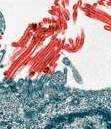 Swine
flu H1N1 virus more virulent than previously thought
Swine
flu H1N1 virus more virulent than previously thought
In contrast with run-of-the-mill seasonal flu viruses, the H1N1 virus
exhibits an ability to infect cells deep in the lungs, where it can
cause pneumonia and, in severe cases, death. Seasonal viruses typically
infect only cells in the upper respiratory system. 23 July 2009
Blood glucose meter for kids connects with
Nintendo DS to help diabetes management
The Didget meter is designed to help kids manage this lifelong condition
by rewarding them for building consistent blood glucose testing habits
and meeting personalised glucose target ranges. 22 July 2009
Structural MRI may help to accurately
diagnose dementia patients
A new study by the Mayo Clinic may help physicians differentially
diagnose three common neurodegenerative disorders in the future. 22 July
2009
Improper use of canes and walkers causes
47,000 falls in US
The American Physical Therapy Association (APTA) is urging elderly
people who use canes and walkers as walking aids to be properly assessed
and fitted by a physical therapist to avoid fall-related injuries. 22
July 2009
New €1.2 million project to establish
cancer communications network in Europe
An initiative to boost cancer prevention, treatment and care throughout
Europe by improving communications within the cancer community was
launched this week. The Eurocancercoms project is an initiative of the
European Institute of Oncology and is led by ECCO. 22 July 2009
Pioneering
cancer treatments developed at Dutch oncology centre with RapidArc
radiotherapy
Doctors at the VU University Medical Center in Amsterdam have developed
new ways to perform radiosurgery on benign acoustic tumours using fast
and precise RapidArc radiotherapy technology from Varian Medical
Systems. 17 July 2009
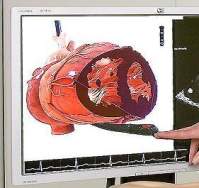 World's first virtual heart brings
breakthrough in education for cardiothoracic anaesthetists
World's first virtual heart brings
breakthrough in education for cardiothoracic anaesthetists
HeartWorks, a uniquely realistic computer-generated model of the heart
and echocardiography simulator, is the result of a 4-year project to
improve teaching of peri-operative transoesophageal echocardiography. 17
July 2009
Scottish imaging network delivers improved
medical imaging for key diseases
More effective medical imaging to help diagnose and treat patients with
Alzheimer’s, stroke, cancer and other conditions is one of the key goals
of SINAPSE, a major Scottish research network. 17 July 2009
Luminex launches two new cystic fibrosis
tests in Europe
The new xTAG tests will be used to provide assistance in cystic fibrosis
screening for newborns and confirmatory diagnostic testing in newborns
and children. The tests also can be used for carrier testing in adults
of reproductive age. 17 July 2009
Sigma Aldrich launches services network for
life sciences industry
The new services network provides researchers with convenient access to
a wide variety of laboratory-based services from a centralized website
location. 17 July 2009
Leica launches improved platform for
confocal and two-photon microscopy
Leica Microsystems has optimized its confocal and two-photon microscope
platform, the Leica TCS SP5 II in close co-operation with leading
research scientists. 17 July 2009
UK life sciences sector applauds government's
Life Sciences Blueprint
The associations say that it provides an excellent basis for firmly
securing the future of the life sciences sector and re-establishing the
UK’s global competitive position. 16 July 2009
UK government launches strategy to put innovative
technology into health
services
The Office for Life Sciences (OLS) Blueprint sets out to transform the
UK environment for life sciences companies and ensure faster patient
access to cutting-edge medicines and technologies. 16 July 2009
EU project to assess the cardiovascular and
gastrointestinal risks of NSAIDs
The SOS project aims to assess the risk of cardiovascular and
gastrointestinal events among NSAIDs users to guide the selection of
NSAIDs that have minimal harmful side effects. 15 July 2009
Inflammation in brain may trigger
Alzheimer’s disease
A new study supports the idea that toxic levels of amyloid beta protein
accumulate in the brain because a pump that pushes it into the blood and
past the blood-brain barrier malfunctions. Certain NSAID drugs could be
used to treat the disease. 15 July 2009
Creato Flu develops salmonella-based broad
spectrum oral flu vaccine
Using a technique applied to veterinary vaccines, a vaccination strain
based on living salmonella is modified by genetic engineering so that
the bacterial cells express highly conserved antigens of various
influenza subtypes. 15 July 2009
Invitrogen launches microarray system to
simplify immunogenetic testing
The new Prodigy system is an advanced DNA and protein analysis tool that
simplifies and accelerates histocompatibility research, vaccine and drug
development, and disease association studies. 15 July 2009
IBM wins award for developing computer grid
to solve world's most critical problems
IBM earned the award for the World Community Grid, which aggregates
spare computing capacity of 1.3 million PCs belonging to 460,000
volunteers from over 200 countries and uses it for humanitarian
research. 15 July 2009
First human receives cardiac stem cells to
repair damage caused by heart attacks
Doctors have completed the first procedure in which a patient's own
heart tissue was used to grow specialized heart stem cells that were
then injected back into the patient's heart in an effort to repair and
re-grow healthy muscle in a heart that had been injured by a heart
attack. 15 July 2009
Better estimates of A(H1N1) flu virus
severity needed, say experts
Accurate estimates of the severity of the new H1N1 virus, and in
particular how many deaths might arise over the course of the pandemic,
are central to healthcare planning over the coming months, say experts
in a paper published on bmj.com today. 14 July 2009
Key gene giving embryonic stem cells ability to differentiate into
any cell identified
The gene, discovered
by an international team of researchers from the US, Portugal and
Israel, and seems to act by maintaining the genetic
material open and poised to express any gene. 14 July 2009
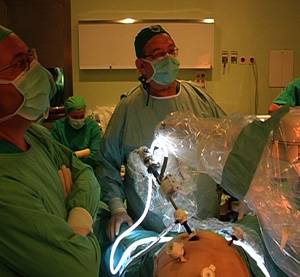 Malaga
University develops first Spanish surgical robot
Malaga
University develops first Spanish surgical robot
Laparoscopic surgery has been performed for the first time in Malaga in
a routine operation using a robotic assistant in the Hospital
Universitario Virgen de la Victoria. The robot was developed by the
University of Malaga and is manufactured by Spanish company SENER. 14
July 2009
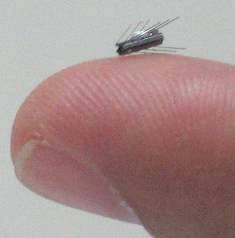 Miniature
robot crawls through veins
Miniature
robot crawls through veins
The Technion - Israel Institute of Technology has unveiled a miniature
crawling robot (ViRob) just 1 mm in diameter that has the potential to
perform precise medical procedures inside the human body. 14 July 2009
Combined drug, hormone and radiation
treatment cures prostate cancer
An experimental drug therapy used in combination with standardized
hormone treatment and radiation therapy has enabled two patients, whose
prostate cancer had been considered inoperable, to become cancer free. 8
July 2009
How obesity increases the risk of diabetes
Researchers at the Salk Institute for Biological Studies have identified
the missing link between obesity and insulin resistance Their findings,
explain how obesity sets the stage for diabetes and why thin people can
become insulin-resistant. 8 July 2009
New detector promises earlier detection of
viral infections
A new respiratory virus detector developed at Vanderbilt University is
sensitive enough to detect an infection at an early stage, takes only a
few minutes to return a result and is simple enough to be performed in a
doctor's office. 8 July 2009
Reading brain signals without inserting
electrodes
A University of Utah study shows that brain signals controlling arm
movements can be detected accurately using new microelectrodes that sit
on the brain but don’t penetrate it. 8 July 2009
New fluorescent nanoparticles could track
uptake of drugs
Researchers at the University of Leicester have discovered a method to
create fluorescent silicon nanoparticles that could be used to track
biologically sensitive materials in the body. 8 July 2009
Chemical nose could provide more accurate
indication of cancer than biomarkers
Using a 'chemical nose' array of nanoparticles and polymers, researchers
have developed a new, more effective way to differentiate between
healthy and cancerous cells and also between metastatic and
non-metastatic cancer cells. 8 July 2009
Octagon launches CheckPoint validation
software for life sciences industry
Octagon Research Solutions, Inc., has announced the availability of
CheckPoint, a new software solution aimed at trouble shooting costly
data compliance issues for the life sciences industry. 8 July 2009
New discovery shows how cancer spreads
A Finnish-led research group has discovered a mechanism that lung cancer
cells use when spreading around the body to form metastases. 6 July 2009
European project to assemble a virtual
human body to aid medical research
The Virtual Physiological Human (VPH) is a pan-European project that
aims to create a methodological and technological framework to deliver
patient-specific computer models for the personalised and predictive
healthcare. 6 July 2009
St Thomas' Hospital buys Siemens portable
ultrasound systems
The London Hospital has bought three Acuson P10s, a handheld,
pocket-sized ultrasound system that can be used for rapid, point-of-care
assistance in a variety of conditions. 2 July 2009
Industry experts in partnership to
stimulate UK medical technology sector
The team behind the UK Access to Finance for Healthcare Technology
Companies programme has today announced an alliance with two of the
leading organisations in the regional medical technology sector. 2 July
2009
Karolinska University Hospital to offer
Saladax 5-fluorouracil assay to European oncologists.
In collaboration with Karolinska, Saladax can now offer 5-FU testing and
5-FU dose management to hospitals and oncologists throughout Europe. 2
July 2009
Rubicon Genomics introduces PicoPlex single cell whole genome amplification kit. 2 July 2009
BioSante Pharmaceuticals and Cell Genesys sign
merger agreement.
2 July 2009
GE Healthcare and Geron in global agreement to commercialize stem cell drug discovery technologies. 2 July 2009
GlaxoSmithKline signs contract for Phase Forward clinical trials software. 2 July 2009
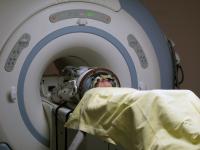 Non-invasive
neurosurgery with focused ultrasound a world first
Non-invasive
neurosurgery with focused ultrasound a world first
Ten patients in Zurich, Switzerland, have successfully been given brain
surgery using focused ultrasound to kill tumour cells without cutting
open the skull. 2 July 2009
Focused ultrasound offers better treatment
for prostate cancer
An experimental treatment that uses ultrasound waves to kill prostate
cancer cells may be able to treat men without surgery, with fewer side
effects and with only a short stay in hospital, according to a UK study
published in the British Journal of Cancer. 2 July 2009
June 2009 >>
2009
Jan |
Feb |
Mar |
Apr |
May |
Jun |
Jul
2008
Jan |
Feb |
Mar |
Apr |
May |
Jun |
Jul |
Aug |
Sep |
Oct |
Nov |
Dec
2007
Jan |
Feb |
Mar |
Apr |
May |
Jun |
Jul |
Aug |
Sep |
Oct |
Nov |
Dec
2006
Jan |
Feb |
Mar |
Apr |
May |
Jun |
Jul |
Aug |
Sep |
Oct |
Nov |
Dec
2005
Jan |
Feb |
Mar |
Apr |
May |
Jun |
Jul |
Aug |
Sep |
Oct |
Nov |
Dec